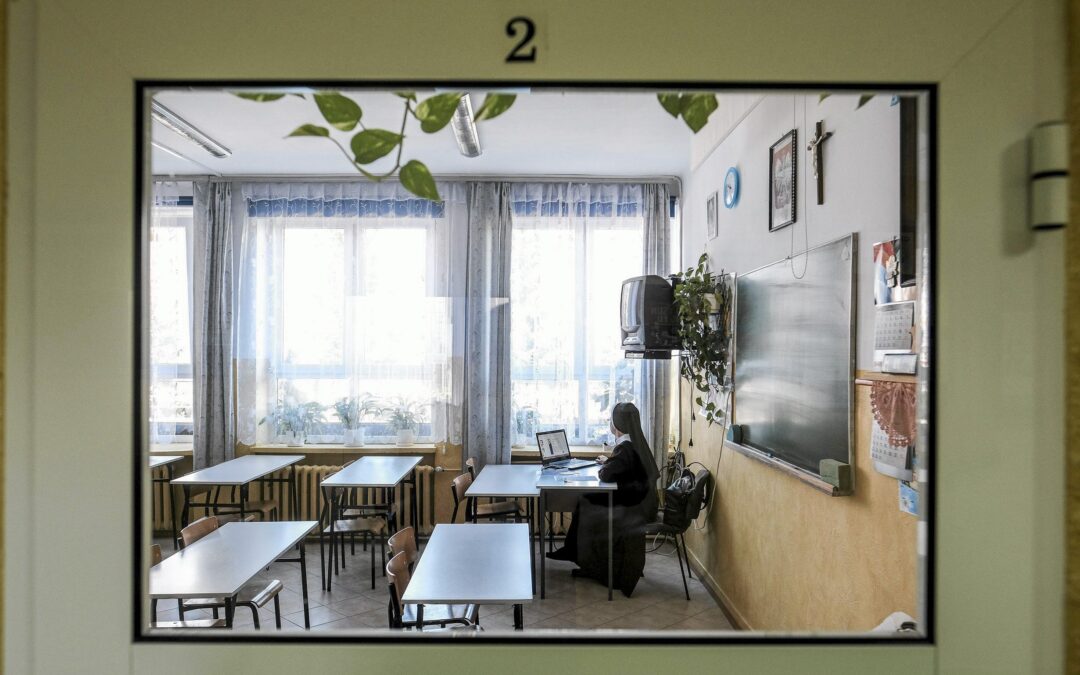Official data indicate that growing numbers of children are opting out of Catholic catechism classes. While that trend has been apparent for a few years, it seems to have been accelerated by the pandemic, education reform, and growing disillusionment with the church, including over a new near-total ban on abortion.
The lessons, known as religia (religion), are hosted and financed by public schools but with curriculums and teachers (often priests or nuns) chosen by the church. They are optional, but a majority of children – around 70% in 2018 – attend them.
However, data from Poland’s third-largest city of Łódź show that, while around half of the 62,000 pupils began the school year attending religion, over one third of the participants (12,052) have subsequently dropped out of the lessons, reports Dziennik Łódzki.
Likewise in Kielce, a city of 200,000 in south-central Poland, the municipal authorities revealed last month that, of the 6,474 high-school students who had enrolled for religion classes at the start of the year, almost one third (2,023) had since opted out.
Attendance had already been in decline since peaking at 93% in 2010, according to regular polling carried out by CBOS, a state-linked research agency. In Poznań, another large city, only 40% of high-school students signed up for religion at the start of this academic year, down from 47% in the previous year.
Those describing themselves as non-believers have risen from 5% in 1996 to 17% last year
– The proportion who attend religion (essentially Catholic catechism) classes at school has fallen to 70% from a peak of 93% pic.twitter.com/94iprOJyl5
— Notes from Poland 🇵🇱 (@notesfrompoland) July 22, 2019
One possible catalyst of the process may have been an unintended consequence of the conservative government’s education reform, notes Gazeta Wyborcza.
The disruption and timetabling difficulties caused by the abolishment of middle schools – with pupils absorbed into primary and high schools – meant that religion classes often ended up being scheduled at the start or end of a day. That encouraged children and parents to opt out in order to be able to arrive at school later or leave earlier.
“Jakub was supposed to have religion twice [a week] at 7.20 a.m.,” the mother of one high-schooler told Gazeta Wyborcza. “My son is still unconscious at 10 a.m., let alone at 7. That’s why I signed him off.”
Last year, the bishop of Świdnica wrote a letter to parents saying he had received “disturbing news that many young people do not participate in religion classes because they are held at an inconvenient time”. He urged parents to demand that schools schedule the classes at better times, reports Gazeta Wrocławska.
The pandemic – which has resulted in most children switching to remote learning – has also reportedly led many children to leave religion classes, with parents wanting to minimise their time spent in front of screens.
Another reason appears to be October’s Constitutional Tribunal ruling that introduced a near-total ban on abortion. The change is opposed by a large majority of Poles – in particular women aged under 40 – and has prompted the largest protests in Poland’s post-communist history.
Much of that anger has been directed against the Catholic church, which has long called for a ban on abortion. The church’s reputation in Poland has also been hit by a series of revelations regarding child sex abuse by clergy and alleged cover-ups by bishops.
As a consequence, polls show that trust in the church has decreased significantly, especially among the young. Only 9% of Poles aged 18 to 29 hold a positive view of the church, found IBRiS in November. The church has also admitted that apostasies are on the rise.
This process appears to have had an impact on attendance of religion classes, too. “In November, December – during the biggest demonstrations – something happened,” Marcin Józefaciuk, headteacher of a school in Łódź, told Gazeta Wyborcza.
“Although religion was in the middle of the timetable, although we have a decent catechist, young people quit,” said Józefaciuk. He reported that many of the official documents declaring that students were giving up the classes had lightning bolts, a symbol of the abortion protests, drawn on them.
“Despite enormous protests, the government is not withdrawing from pushing through the [ruling], which is opposed by a large part of the public,” said Joanna Miska, a scholar of educational ethics at the University of Łódź.
“Leaving religion [classes] is therefore a quick form of action that gives a sense of agency, and this is important for everyone, especially for young people,” she added.
By mid-November, just three weeks after the start of the protests, hundreds of children had been withdrawn from religion classes in just one district of Warsaw, Ursynów, notes Polska Times. “Parents are manifesting their support for the Women’s Strike with action,” reported a local news outlet.
At the end of that month, a priest in the city of Szczecin wrote to all parents at one school expressing concern that he was teaching catechism to an increasingly “empty classroom”. He warned those who had withdrawn their children that they would “stand before God’s judgement” over their decision to “reject the faith”.
Main image credit:

Daniel Tilles is editor-in-chief of Notes from Poland. He has written on Polish affairs for a wide range of publications, including Foreign Policy, POLITICO Europe, EUobserver and Dziennik Gazeta Prawna.




















